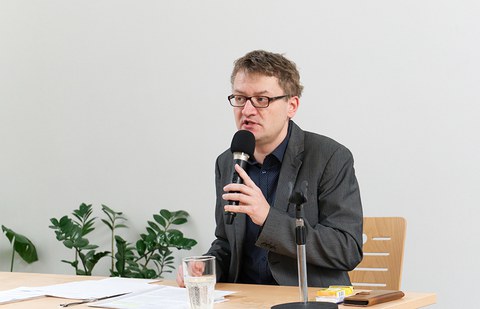Reading from Victor Klemperer's diaries
History lessons and the culture of remembrance: Students in grades 9 and 11 immerse themselves in the history of TUD and Victor Klemperer's life
Victor Klemperer taught as Professor of Romance Studies at TUD before he was dismissed in 1935 due to his Jewish roots. His diaries describe the reality of Jewish persecution under the Nazis in detail and are therefore indispensable historical documents. The author and publisher Dr. Renatus Deckert meets with pupils from Dresden in grades 9 and 11 to read selected diary entries at TUD. He provides his commentary on the excerpts and puts them into historical context for the children.
The reading is accompanied by a lecture by Dr. Hagen Schönrich (scientific coordinator of the project "TH Dresden under National Socialism"), who provides information on the role of academia under National Socialism.

Dr. Renatus Deckert bei der Lesung aus Victor Klemperers Tagebüchern am 11. März 2025 an der TUD.
Dr. Deckert has been hosting public readings of Victor Klemperer's famous diaries for years. We made sure to pick his brain about it.
Question: What made you start organizing readings from the Victor Klemperer diaries?
I wanted to do my part in making sure that history is not forgotten and help to combat the guilt cult rhetoric from the far right. With German politicians describing National Socialism as a historical “speck of bird poop”, German war crimes being relativized, anti-Semitism becoming socially acceptable again, and Jews feeling threatened in Germany eighty years after Auschwitz – it is high time to speak out against it. "Never again!" is a recurring theme on remembrance days. But it's not enough to just repeat this phrase, you also have to live it. And that means educating people. That's why I've been going to schools for a few years now to read from Victor Klemperer's diaries and talk about what happened back then in Dresden and elsewhere publicly. The persecution of the Jews was not something that just happened in secret. You couldn’t ignore or avoid it unless you looked away and covered your ears.
Question: What are the readings like? Are the pupils interested in the topic?
Yes, they’re really interested and empathetic. The room is often very quiet during the readings. And then I get lots of questions. These are usually comprehension questions, because they want to know something in more detail. Specific details, figures. But I also sense a lot of bewilderment: How was that even possible? Why didn't anyone do anything? Recently, questions about the present have become increasingly frequent. It's about the fact that "biodeutsch” (a colloquial term first used by people of color to describe white Germans, used since the 2010s by the far right) has been voted the un-word word of the year. Or an audience member asks me what they can do if someone in their family makes anti-Semitic or racist remarks. You can definitely sense how perceptive many young people are; they look very closely at what is happening in the world and in this country. I encourage them not to look the other way when it comes to weaker people and minorities, to get informed and involved. Victor Klemperer wrote about life under National Socialism, but even today it is important to take a stand and stand up for your own values.
Question: Have you ever experienced someone in the audience denying the Holocaust during your readings?
No, that would have been a criminal offense. But there are various degrees to which you can express your ignorance or unwillingness to accept historical facts. However, this tends not to happen in the general context of a reading, but afterwards, when individual pupils come to me and ask me questions, for example: "How do you know that the gas chambers actually existed?". Or the other day, when someone told me that the number of people murdered in the Shoah was actually much lower; he supposedly knew of a document that proved it. Of course, you have to challenge that. It becomes difficult when someone doubts everything and it’s difficult to argue with someone who is convinced that the earth is flat, for example, and for whom neither facts nor arguments count.
The readings are organized by the school contact point and the unit 9.2 university and society. They take place annually in February or March.
